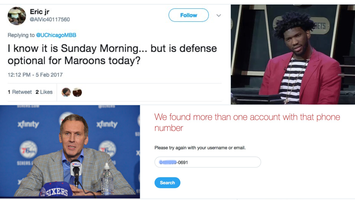 Just when we thought 2018 couldn't be more of a soap opera (or 2017, or 2016 for that matter) we get the news that an NBA executive is reported to have multiple Twitter accounts to pump himself up, leak medical information about players, and at times trash his own roster. What will happen with the 76ers, and the possibility of trying to land LeBron this summer in free agency is up for debate. But it exposes a hidden reality of leadership - putting our name with our words. Let's face it. When you're in a public role, no matter the size of the church, you're going to face critics. There will be people who don't like your leadership style, your preaching, the vision you're pursuing, or any number of other things. True story: in a previous stop I was told by someone they voted against me coming because they didn't like my haircut. With the rise of social media and its troll activity, one of the worst places for pastors to face criticism is online. Whether it comes from anonymous sources or watchdog sites or from disgruntled people with a keyboard, the instant magnification can blow up a critic's influence. And that's where we as leaders have to avoid jumping in. Proverbs 26:4 reminds us to "not answer a fool according to his folly, or you'll be just like him." I loved how Ed Stetzer always described it, that getting into social media defenses or arguments is like wrestling a pig--you both get dirty, and the pig likes it. Sadly this is a lesson we often have to learn the hard way, and recent history is filled with stories of pastors logging in to community pages as someone else to engage critics or defend themselves, only for it to end catastrophically. How can we maintain our pastoral integrity and avoid falling into the pit? 1. Unplug For A Season - Sometimes the best thing for your soul, and sanity, is to just stay off and delete the app. If you don't see it, you're not tempted to respond or reply. Sometimes ignorance really is bliss. And if you take the time to stay away, you're not opening yourself to the toxicity and cancer that can form when you're immersed in social media. *Side note - This also means that you don't need to respond or reply to every post or comment 2. Don't Hit Send - I get it, you want to fire off a response or an email. Who doesn't? But the problem is once it's out, you can't take it back. Even if you delete it. It's there. In another era, people were encouraged to write the letter and then throw it in the trash. This is the same concept: type it out. Let it fly. And then delete it. 3. Keep Perspective - A few months ago a passing comment by someone on our leadership team was taken super-seriously and led to a "meeting" where the concerned person shared the comment and how much it had bothered them. Needless to say, we had to think back to what was said because to us, it wasn't a big deal. That's the perspective you have to keep. 99% of the kerfuffle on social media is trivial. And if you engage every comment or critic on every point, you'll go crazy. But if you keep perspective it'll help you navigate. Some things do require a response and reply. Those are major issues. Answer those. Deal with them wisely and biblically. But for everything else, just ask a simple question "Will this matter tomorrow?" I'm always curious how other people handle these kinds of moments. How do you respond on social media?
1 Comment
8/28/2019 09:25:47 pm
I feel upbeat in the wake of perusing your perspectives. You attempt their best to give the best data at this issue. The individuals who run the congregation truly regard and give the great data to the individuals. Be that as it may, a few people did not give the proper data to their student which isn't the great way.
Reply
Leave a Reply. |
Scott M. DouglasA blog about leadership and the lasting legacy of family ministry. Archives
August 2023
Categories
All
|
 RSS Feed
RSS Feed



